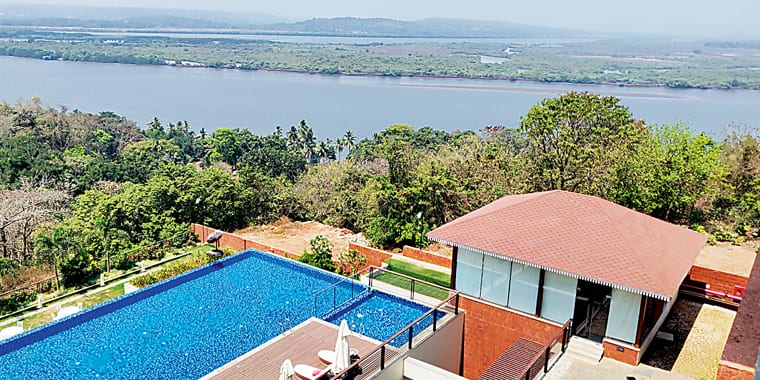On the banks of the Mandovi
Close to nature. From the use of laterite, a stone indigenous to Goa in the architecture of the hotel to the use of natural light in many of its public areas, and stunning rooms with views of the Mandovi river, DoubleTree by Hilton Goa Panaji has the guest connected to the natural elements throughout his stay. By Steena Joy
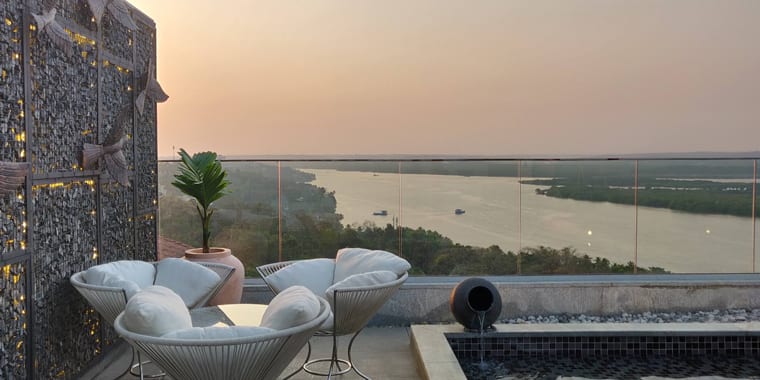
As you enter a river facing room at the DoubleTree by Hilton Goa Panaji, you are welcomed by stunning views of the Mandovi River, flowing adjacent to the hotel. Even the fitness centre near the infinity swimming pool is a glass enclosure where a guest can have outdoor views while sweating it out. A 130 year old mango tree in the centre of the open courtyard in the hotel serves not only as a meeting place for hotel guests to mingle with each other over chai and snacks, but also as a venue for many team building activities for member staff. The hotel is located a short drive from the capital city of Panaji and is minutes away from the UNESCO World Heritage Site at Goa Velha.
DoubleTree by Hilton Goa Panaji offers 160 guest rooms, including nine suites and an expansive Presidential Suite with two bedrooms and what’s more, a private terrace with a jacuzzi! The only hotel in Goa to have one. Most guestrooms feature a private balcony with river or landscape views. The rooms also offer DoubleTree Sweet Dreams bed and smart lighting with motion sensors. Executive Rooms or Suites have access to the Executive Lounge.
Location is the USP
Speaking about the USP of the property, Swati Dhir, GM, DoubleTree by Hilton Goa Panaji says, “Location. For us it’s all about our location. Everyone comes to Goa multiple times – it is not a one time holiday destination. So most of us have come to Goa, we have done the beaches, the drinking, the partying but as you evolve you want something more. That’s what the destination offers, that’s what our hotel offers – peace. When you wake up in the morning you can actually hear the silence and the chirping of the birds which is a different experience. And this is such a different part of Goa which most tourists have otherwise not seen. What we offer is the location, and the peace to spend time with yourself and your loved ones and rejuvenate yourself with scenic views of the Mandovi river. In addition we are very very close to everything. So when you are in the hotel, it looks like you are away but if you actually step out most tourist attractions like the Old Goa church are right there. The spice plantations, the Mangeshi temples all of that belt, we are the closest hotel.We are also the closest from the airport. We are 10 minutes from Panaji city. We are 12 to 13 minutes from Miramar beach. So it’s not like we are far from the beach, it’s just a perception because we are not where everything else is.Which is a benefit in itself. So you go, party, see the tourist sites and then come back, that’s what the resort offers, that’s our biggest USP.”
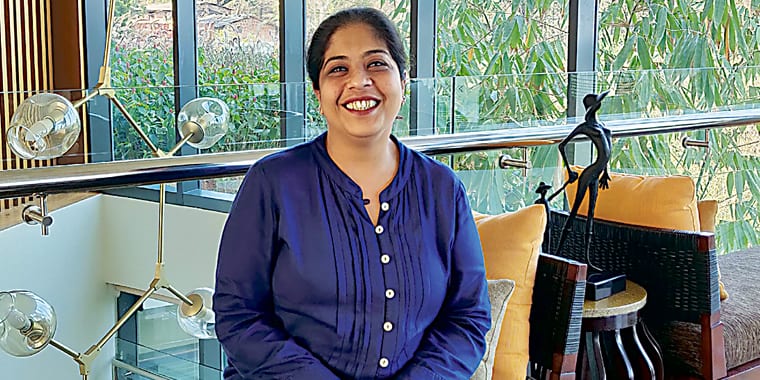
The hotel has three dining outlets. There is Feliz overlooking the river which is open only for dinner. During the day, it serves as a bar for the poolside. Chef Lawrence Amalraj, executive chef, says, “Most of the names of our restaurants are colonial inspired. Feliz (means celebration) has a seafood concept and it serves more Mangalorean (60 per cent) than Goan (40 per cent) because we are located more in the Manglorean belt. The all-day Comida (meaning food in Portuguese or Spanish) offers a buffet breakfast or delicious bites through the day. For an intimate experience, Rio Salao (meaning river lounge) has an eclectic menu of light bites and beverages, and ‘grab and go’ options.” Commenting on the food preferences of guests, Chef Amalraj adds, “Earlier people wanted exotic food but now they just want simple, fresh food – no drama in the food, no experimenting. We procure most of our raw ingredients from Goa itself and only a few stuff is imported. We buy the local poi (bread) from the local bakery. This way we not only support the local community but also retain the authenticity and maintain sustainability.”
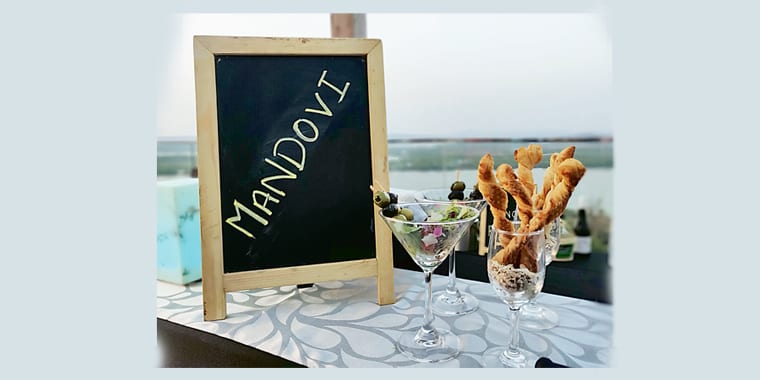
The hotel does a lot of corporate events in its large ballroom, Sunset Lawn, and two boardrooms equipped with state-of-the-art equipment and amenities. Not surprisingly, the mango tree in the courtyard is used for events too. The chef reveals that the hotel is set to host its first wedding event of 150 to 200 pax for a Gulf NRI.
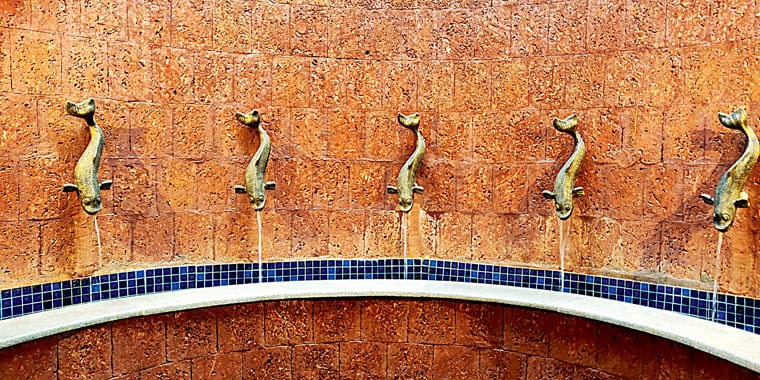
Elaborating on the hotel architecture, Dhir explains, “It is Goan Portuguese inspired. The architect was very enamoured with the Goan churches which he has duplicated in the lobby which has a high roof and a steeple in the centre. But he has combined that with a modern feel so our tiles have an authentic Goan Portuguese feel and still have a modern contemporary look. Lot of our stuff is local. In the kitchen, our crockery, cutlery is artisanal, nothing is imported – everything we use is as much local as we can do except for anything that is a brand standard.”
Growth in the Goa market
Dhir has been in Goa since 2004 and from that time till today she feels that the market has just gone up. “The number of tourists has changed from international to domestic – hoteliers’ reluctance to say that Indian tourists are noisy and they don’t pay are today banking on these very Indian tourists. So in season, a 70 per cent international and 30 per cent domestic ratio earlier, has just moved the other way round now. Goa is now a 12 month market. Previously, in 2005-2006, smaller hotels used to close in summers. Now that does not happen. There is demand through the year. Goa is one market that has not seen a dip in the last seven or eight years. And with new inventory, big or small hotels still continue to grow and sustain tourism.”
Dhir opines that in terms of numbers, the Goa market has grown. “But in terms of the destination per se, I think we have devolved. Goa had this certain charm, that’s what people came for. Now Goa only has people who don’t respect what Goa is all about. The ban on public drinking is a very very important decision that has come two years too late. You don’t want Goa to be known about by someone who sits topless on a bike with a beer can in his hand and posts an instagram picture. That’s not the Goa we are talking about. Almost everyone in Goa drinks but you will not see a local misbehave after having a drink. We need to be respectful of the places we visit. But having said that, from a business perspective, Goa is still a very very buoyant market,” she believes.
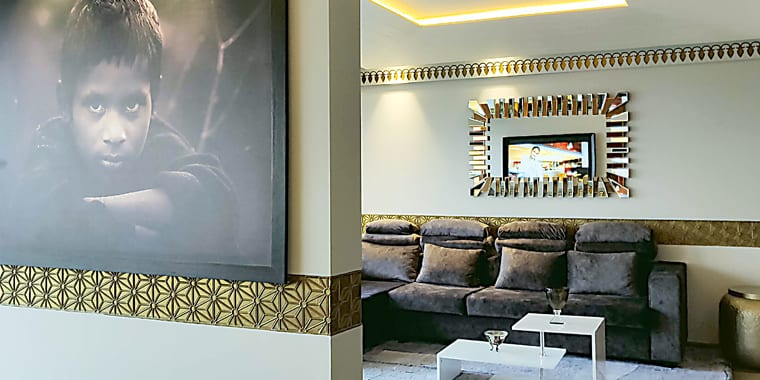
According to her, room occupancies or the Revpar has also grown consistently year on year. Hotels have opened at different levels, people find their niche. “Even if you look at competition figures, over the last year occupancies have grown. ARRs have sustained in the five-star segment. This year will pretty much stagnate in terms of rates but occupancy is still growing. The number of people coming in are growing. But the rates are holding on to last year’s levels so we currently don’t see that kind of an increase,” Dhir predicts.
The attrition challenge
When you look at attrition in Goa you will see, specially with the established hotels, that attrition is highest at the entry level, it is highest with the local team members who join – they will work with hotels for two to six months then take a break and work on the cruise liners. Dhir agrees, “In our case because we opened at a very odd time, local college batches were already placed, so we did offbeat colleges- we went to the East of the country which nobody does like Darjeeling, Kolkata, etc So you will see a lot of our team members are not local, which is not by choice – it just happened like that. We are now hiring more. And majority of our team members are first timers – for 60 per cent of them, this is their first job. They are driven to prove something and so we feel fortunate as far as attrition is concerned. It is much lower than acceptable industry norms which is about 35 per cent+.”
As a company the group has CARE (Creating A Rewarding Environment) a programme that takes care of team members and all other stakeholders. “So whether it is training or team building activities, we have something all the time. This team building is very important and we even do it near the mango tree,” adds Dhir.
As for sustainability, for a hotel this size,DoubleTree by Hilton Goa panaji has no boilers. All the hot water comes from residual waste energy. The hotel also does its own composting for manure and avoids plastic as much as possible. It also works with an NGO – Sundara for recycling waste soap. Her management mantra? “Any leader is as good their team. You have to have people who are driven because if your team is not driven at the ground level, they will not challenge you upwards. Challenges are what make us better,” asserts Dhir.

